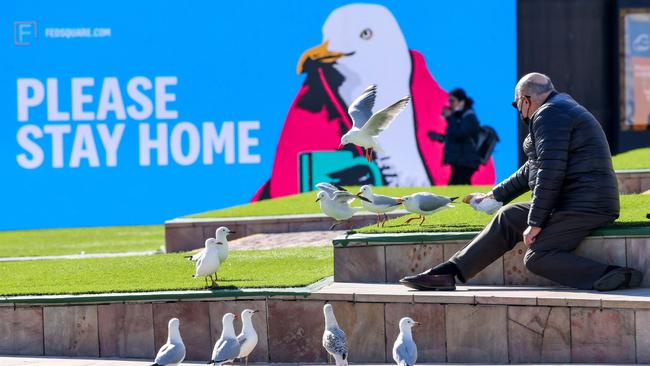Melancholy the measure of the true cost of Covid

Well, anyone who has survived the rigours of Melbourne’s lockdown – the one that stretched to 100 continuous days, the longest outside China – will tell you that the happy stats are no guide to the melancholy the measures against Covid engender.
People have had it. They’re not off their heads exactly, they’re just likely to surrender – after lifetimes of concerted and distracting work (standing up in court, telling cameras to roll, bringing up children) – to the thought that they would just as rather take refuge in a sea of codeine or whiskey or some other sweet oblivious antidote.
Not literally. Just as a passing wave of sadness in a world that can seem diminished. We forget, after all, what sustains us by distracting us but there’s nothing like the sight of society shuttered and abridged to remind us of the world we have lost. The dinner parties foregone, the offices closed down, the friendships on hold.
Margaret Thatcher got into a lot of trouble for saying there was no such thing as society but she didn’t imagine the world of Covid melancholy where society is like a memory lost.
Let’s say some significant (or if you prefer idle) part of your life was spent going to theatre first nights and drinking your way through the verdict afterwards. Or going to the pub every week or two and listening to your old mates, who might work for a politician or knock off political columns or write novels, weave the wind, sounding like characters in a Chekhov play as they indulge their arias of anecdotal self-reflection. Most of this has shrunk to a tiny fraction of itself.
This is not the tumult of sexual passion or the thrill of deep sea diving or the ecstasy of mountain climbing. It’s the small change of life – but try living without it.
The world we currently inhabit, the one Melburnians are almost blase about and Sydneysiders are getting used to, was ready to accommodate this plague-time world of depressive circumstances. Business always knew a lot of its employees could work from home on their computers and that they could save on the curtailment. We all knew it was much more economical to send an email than have a face-to-face meeting.
But just think what gets lost with the loss of the office. Most people are likely to find offices as confronting and off-putting initially as school: then they end up marrying or getting intimate with their fellows.
And think of the kids. Everyone knows there’s more to school than book learning. There’s sport, there’s fun, there’s larking around but where are we when it’s gone? What happens to going to university – one of the most formative and privileged experiences a person can have – when nobody can go? They can’t indulge in debating or cricket or pleasures of choice, they can’t make out with their peers and quarrel with their pet hates. They can be taught, they can talk in tutes, they can intellectualise through the magic of Zoom (and thank God for it) but these are melancholy substitutes and they drive people a bit crazy because they are not the real flesh and blood thing. A virtual reality is just that, a chimera.
Melbourne may or may not emerge from this dark night that Sydney is in the midst of. At the moment it doesn’t look like it, but we know the cost after 200 days of lockdown. Australia is a country which, at its best, or at any rate its most beleaguered, tries to look after people. Hence the massive fiscal outlay, Keynesian in its rationale, such as the JobKeeper type backups. And we are clearly pushing for a policy of virus elimination until the woefully slow inoculations kick in, which is why life is locked down.
It’s good that multitudes of people are not topping themselves and no doubt the funding Scott Morrison gave to that custodian of mental health, Professor Pat McGorry, helped. But let’s not pretend there has been no cost to our collective sanity and happiness.
In 1621, a few years after the death of Shakespeare and a couple of decades before the English Civil War, in which Anglo-Catholics and Puritans, cavaliers and roundheads tore Britain apart, Robert Burton wrote The Anatomy of Melancholy, one of the greatest works of nonfiction in the language in which he delineated the thousand faces the madness of melancholy could take. It’s a funny book and a wise one.
And it’s a reminder that there’s a cost to our souls.



So we’re told that we have coped well with the mental affliction we imagined would follow – as night follows day – the lockdowns designed to combat the virus. Suicide rates have not soared nor diagnostic verdicts on crippling depression and disabling vertiginous levels of anxiety. And this augurs well for the city of Sydney, which is in the midst of a long haul of lockdown.